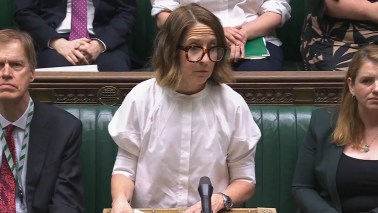
Mr Gordon Brown, the Prime Minister, is to pay back £12,415.10p that he claimed in expenses between 2004 and 2008
Mr Gordon Brown, the Prime Minister, is to pay back £12,415.10p that he claimed in expenses between 2004 and 2008; he had received a letter, along with all other MPs, on the day Parliament returned from its summer recess, from Sir Thomas Legg, aged 74, a retired permanent secretary at the Lord Chancellor’s Department appointed by the Members Estimate Committee as an independent auditor. More than £10,000 of Mr Brown’s repayment relate to cleaning bills. Mr David Cameron, the leader of the opposition, was asked by Sir Thomas to explain why he had needed to repay £218.96p in interest on the mortgage on his constituency home in Oxfordshire. In a separate affair Ms Jacqui Smith, the former home secretary, apologised to the House of Commons, on the recommendation of the Commons Standards and Privileges Committee, for having wrongly designated her sister’s house in London as her main home; but she did not have to pay back any of the money she had incorrectly claimed. Mr Brown announced that the government would try to sell the Dartford crossing over the Thames, the Channel Tunnel rail-link and the Tote. Previous attempts to sell the Tote failed in 1999, 2003 and 2008. ‘Of course we’re not going to sell at the bottom of the market,’ said Lord Mandelson, the First Secretary of State, ‘we’re not idiots.’ Mr Brown had his right eye, through which he can see, checked at Moorfields Eye Hospital. Mr Brown agreed to send a further 500 troops to Afghanistan, taking Britain’s commitment there to 9,500. The Territorial Army was forced to abandon training for six months to save £20 million. The Consumer Prices Index fell in September to an annual rate of 1.1 per cent; the Retail Prices Index, which includes mortgages, fell to minus 1.4; the pound fell against the euro and the dollar. Unemployment rose to 2.47 million. The Communication Workers Union voted to hold national postal strikes. Amazon, the internet booksellers, made plans to use other carriers. Members of the Northern Ireland Assembly enjoyed an address by Mrs Hillary Clinton, the US secretary of state, who hinted that the Americans might invest in the province if its devolved administration could agree on running its own policing and justice department. Ian Wallace, the opera singer and regular participant in My Music, died, aged 90. Neighbours wrapped Rita Longbottom, an 80-year-old woman with dementia, in blankets while they waited for a locksmith to let her into her flat in Southport, Lancashire, because they had been told that the warden of their sheltered housing could not come downstairs and open the door as it would breach a European working time directive.
President Barack Obama of the United States was awarded the Nobel Peace Prize for his ‘efforts to strengthen international diplomacy and co-operation between peoples’, in particular his ‘vision of and work for a world without nuclear weapons’. Mr Obama continued to ponder whether to send 40,000 more troops to Afghanistan or perhaps to kill al-Qa’eda suspects with unmanned drones. Political warfare continued at home over his health-care reforms. In the meantime, the National Aeronautics and Space Administration, a US agency, smashed two spacecraft into the Moon, each with the impact of a ton and half of TNT. But scientists were disappointed: ‘We didn’t see a big splashy plume like we wanted to see,’ said Dr Michael Bicay of Nasa. Mrs Clinton flew from Ireland to Moscow to seek Russian co-operation on the nuclear ambitions of Iran; she was told by Sergei Lavrov, the Russian foreign minister, that ‘sanctions and threats of pressure in the present situation are counter-productive’. Mr Vladimir Putin, the Russian Prime Minister, was away in China, seeking to sign trade deals worth $5 billion. China entered negotiations with Guinea, ruled since December by Captain Moussa Dadis Camara, to spend perhaps $5 billion to exploit minerals and oil. The Iranian parliament voted to reduce state subsidies on bread and telephone calls. Pakistan forces regained control of military headquarters in Rawalpindi taken for a time by the Taleban, leaving 19 dead. A car bomb in the town of Alpurai in the Swat valley killed 41. The French authorities charged Dr Adlene Hicheur, a scientist who had worked at the Cern project in Switzerland, with ‘criminal activities related to a terrorist group’, which security sources claimed was al-Qa’eda. The Pope canonised Fr Damien, the Belgian who died of leprosy in 1889 on Molokai, a Hawaiian island. Stephen Gately, a singer with the Irish boy band Boyzone, was found dead in his house in Majorca, aged 33. A chalk portrait of a young woman, sold for $19,000 in New York in 1998 as ‘German, early 19th-century’, is claimed by Professor Martin Kemp to be by Leonardo and to show a fingerprint ‘highly comparable’ with his. At Um Jaozeh in Jordan a flock of sheep burst into flames when methane leaking from the ground ignited. CSH





Comments